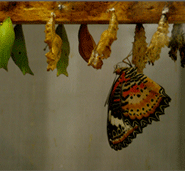In Idyllic (or IDLE-ic) Vermont, as the case may be, I spent a summer reading seven volumes of Proust and writing poetry. Why? I was asked by many. At my surprised glance back, the questions became more detailed: I mean, what is this for? What do you get out of it? Forced to answer, I resigned to the perfect eye-roll inciter: For the soul. Some appreciated the word's inherent lack of meaning and realized that I was purposefully (and paradoxically) taking time out to read for the sake of reading, to stretch time across a lake, leave it on a page, stuff it into a traffic cone. Others rolled their eyes.
The idea of doing something purely as an aesthetic experience, without it necessarily eventuating in a tangible reward is waning from our psyches. Even attending a party is the accumulation of 'social capital'. Visiting an old uncle is to return those days he spent teaching us golf when we were young, or more sinister, hope he will leave the leather bound Norton Shakespeares in your name. We even justify giving up as 'at least having tried'. Are we ignoring and therefore attempting to defy the interminable gulf between sign and signifier, between a word and its meaning, between us and others, between the person and the world and between the several parts of ourselves? That everything should have purpose and meaning is an idea that gives us hope to move onward painlessly, and with more purpose. Purpose over purpose, like books that are bound to fall.
I propose this: an acceptance of the gulf. An acceptance that to love another is to enable the gap between you and the other to consume its own, irrational, geometric space. To live purposely without purpose. To be to be, to do to do. To read to read to make art to make art to live to live. Proust says, If a little dreaming is dangerous, the cure for it is not to dream less but to dream more, to dream all the time. But the article, ironically, where I lift this quote from is called 'Hack your Brain Into Productive Daydreaming'.
So here is introducing The Useless Issue that comprises four lists that utilize the idea of the useless in quirky, contemplative ways.
Avni Doshi, in truly "meta" form, parodies the words you'll eavesdrop on, or worse, have to endure directly, at an art opening or a 'salon'. How far they stray from the raw, instinctive energy of the work of art itself, how little they mean, how oft we use them, how empty they leave, how full we think we appear, like a half moon on an ontological sky.
Navin Thomas reveals his personal pop culture fetishes, the television show that forced him home on Thursday afternoons, the Robots that allowed him to find the beauty in the ruin, the human in the machine and play with the dialectics of light and dark to find inspiration for his own uncannily precise found sound.
Veeranganakumari Solanki makes a slide show of 11 artists who utilize everyday objects and rid them of their functionality, rendering them purely aesthetic, forcing the viewer to find the elegant beauty in its essential shape, form and color.
Finally, I have included a list-poem about a person who is being transformed into a work of art, devoid of purpose. This eerie quality sparks questions about the indulgence of art: is making those we love into works of art the best thing we can do for them or the worst? Is not Love itself blind to purpose, irrational, intangible, finally aesthetic. And do we not feed upon it? I've created a mixtape with a piece by The Mothers of Invention called The Little House I Used To Live In with Frank Zappa on guitar. Zappa was deeply influenced by Indian music and the controlled-chance theories of John Cage, which seem to reflect the poem in its insistence on form.
The Fuschia Tree has let its soil nourish over its Sustainable Summer, reprinting stories with the hope that you've caught up on what you missed and it has cooled you down, ready for more. We're thrilled to
begin
the fall
with
The
Anti-
Fall.
The Idea that Things Are Looking Up, that we are heading towards an optimistic age of doing the things we love because we love to do them, and finding kindness in the unkindest cuts.
So take time to be useless, watch some of the slideshows, find an idle spot, daydream, make something, destroy it, take out a spatula, wear it as a hat, use coffee to paint, sit inside a closet to know the mind of your hangers, or just sit. and know. the mind. and your hangers.
With Purpose,
Himali.
Editor's Note.
Every sunbeam, every strain of music, every sapling and starfish is ultimately the regeneration of a previous something, a collection of somethings, taking on new shape. At the most indivisible level we can comprehend, all life is nothing more than atoms and molecules dancing their way through various forms. And if everything comes from something, it stands to reason that everything must go to something as well.
Read More
Illusion: Seeing Beyond Seeing
Meaning: In Search of Significance.
Melody: A Different Tune
Rhythm: Ordering Time


